Here Are Some Pregnancy Suggestions For Having A Healthy Baby

It’s easy for anyone to end up down the rabbit hole of the “dos” and “don’ts” of a healthy diet. But when the health of your unborn child is dependent on your healthy diet, all bets are off. You’ll do whatever it takes to make sure you’re setting your baby up for success, even if that includes navigating the maze of how to have a healthy pregnancy.
Or maybe you’ve already had successful pregnancies without putting much thought into how your diet impacts this impressionable time of human development. Despite this fact, you’ve had healthy children with minimal complications as far as you can tell.
This article is for both camps. Whether you’re totally obsessed or fighting an urge to stick your head in the sand, there are a few things you need to know to have a balanced approach to optimizing your pregnancy diet. But it doesn’t have to be complicated. The suggestions that follow are meant to inspire and motivate those who are overwhelmed by often conflicting pregnancy diet advice.
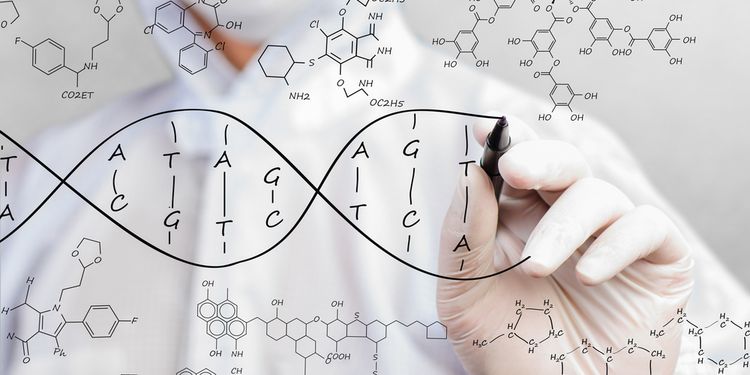
It’s All in the (Epi)genes
Science is starting to understand that the human genome isn’t the end all be all of human development in utero. This makes sense when you think about it. If all of our cells followed the exact same instructions during development, we would be far less likely to develop into complex organisms with highly specified tissues.
While there are certain control mechanisms to regulate cell specification written right into DNA, there are many things that influence this process that have nothing to do with genes and everything to do with what’s going on in the environment.
Enter epigenetics. This word literally translates as “above the genes.” Epigenetics studies how what happens around our genes can influence how they’re actually transcribed, or read.
Furthermore, these changes can potentially be passed down from generation to generation. In essence, this means that our bodies are able to adapt to our environment at the DNA level to create lasting changes in our physical makeup.
This is a good thing. We want our genes to interact with the environment we’re in. It’s also good to know that your genetic blueprint isn’t a signed and sealed forecast of your health future. Unfortunately, due to the high frequency of modern insults to our DNA, including poor diet, toxins, and stress, most of the epigenetic changes may help immediate survival at the expense of our longevity.
So what does this imply for you and baby?
Your baby’s gene expression and development will be greatly influenced by the environment you create in the womb. Epigenetic influence on gene expression is particularly important during fetal development. The womb environment is the lens through which your baby is experiencing the world for the first time. This gives you a tremendous opportunity to optimize the immediate and life-long health of your baby.

How to Optimize the Pregnancy Environment for You and Your Baby
Dave Asprey, a well-known “bio-hacker” and nutrition expert, is versed in the field of fertility and creating the optimal environment for fetal development. His wife, Lana Asprey, MD, was told at the age of 39 that getting pregnant was highly unlikely. Despite this discouragement, Lana and Dave combined their knowledge to create a recipe for fertility that enabled the pair to have not one but two children.
Together, the Aspreys co-authored The Better Baby Book to enlighten the public about what they found that helped them to conceive. Their work explains how to support what they termed “growth mode” during Lana’s pregnancies while avoiding “defense mode”.1 Essentially, Lana and Dave aligned all of the epigenetic stars to ensure their children got the best genetic programming they had to offer.
This article will draw from the wisdom of experts like Lana and Dave to condense the long list of ways to optimize your baby’s time in the womb through simple diet additions and subtractions.
The key here is to set your baby up for success through diet while conserving your energy and sanity. You’ll likely need both of these things once the baby is ready to come into the world!

Why Nutrition Matters for Epigenetics
Diet plays a huge role in the epigenetic modification of DNA expression.
Chris Kresser, another expert in primal nutrition and fertility, writes extensively on the importance of eating nutrient-dense foods for optimal health for you and your baby. Kresser cites the work of a British scientist named David Barker, who is credited for developing the Developmental Origins Hypothesis.
This hypothesis suggests that poor maternal nutrition could potentially increase the likelihood of children developing chronic diseases later in life. Barker’s original research highlighted a correlation between low birth weight, which is an indicator of poor maternal nutrition, and an increased likelihood of developing heart disease.2
This single correlation that Barker discovered has sparked a large body of research investigating the developmental origins of many other chronic diseases. Kresser also cites research that suggests a link between poor maternal nutrition and higher risks of diabetes, obesity, cancer, and even polycystic ovarian syndrome.
Now don’t freak out. Just because your insatiable cravings have led to indulging in less than nutritious foods doesn’t mean your child will end up with all of the above diseases. But this information should inspire you to balance your diet to tip the scales in favor of your child’s lifelong health.
In the following sections, we’ll guide you through some supplement ideas to cover all of your nutrient bases, some nutrient-dense diet additions, some nutrient-devoid subtractions, and some minor lifestyle adjustments to optimize you and your baby’s health.
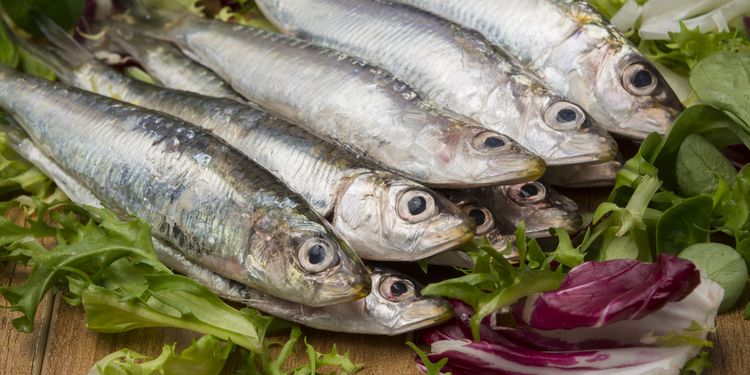
We Are What We Eat
Before we get into specific types of nutrients, it’s important to understand the basic building blocks that it takes to make a baby.
Your growing baby is made up of water, fat, protein, and a little bit of carbohydrates.1
Dave Asprey emphasizes that, aside from water, your baby is predominantly made of fat! If your baby is using fat as a major building block in his or her growth (especially brain growth), going on a low-fat diet during pregnancy will be problematic.1
You can also see why overdoing it on high-carbohydrate foods like breads, pastas, and even whole grains wouldn’t be particularly beneficial. Aside from the fact that these foods are generally lacking nutrients, they’re not a major building block for creating a human being.1
The Wellness Mama is also an advocate for consuming healthy fats and proteins and increasing water intake for a healthy baby. With her multiple pregnancies and extensive knowledge in primal nutrition, she is another exceptional authority on nutrition during pregnancy.
She recommends about 80g or more of high-quality protein per day for a healthy pregnancy to reduce the risk of complications and morning sickness.3 Healthy proteins include grass-fed and pastured beef, pastured poultry, and cold-water fish.
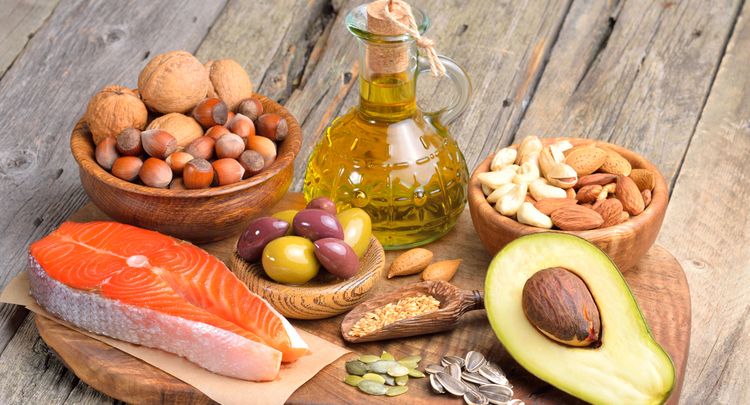
Increased water intake is also a priority, since your blood volume actually doubles during pregnancy. Since your blood is mostly water, Wellness Mama suggests about a gallon of water a day to support this increase in blood volume. Being well hydrated may also help to combat morning sickness!3
The Wellness Mama, Chris Kresser, and Dave Asprey all agree that the inclusion of lots of healthy fats is hugely important for brain and cellular development.
These healthy fats include saturated fats from organic pastured animals and coconut oil, monounsaturated fats found in olive oil, avocados, nuts, and seeds, and omega-3 fats found predominantly in wild, cold-water, low-mercury fish.1
All three experts also agree that any balanced diet, whether for pregnancy or not, must include a variety of vegetables for vitamins, minerals, antioxidants, and fiber.
Dr. Terry Wahls, MD, an expert in cellular health through nutrition, has an excellent formula to ensure you’re getting a variety of vegetables and an equally varied nutrient profile:4
• 3 cups of sulfur-rich vegetables (cruciferous vegetables like kale, broccoli, and Brussels sprouts)
• 3 cups of leafy greens (including spinach and collard greens)
• 3 cups of deeply colored vegetables and fruits (preferably low-sugar fruits like berries and vegetables like beets, carrots, and red cabbage)

In terms of the major food groups, these recommendations should cover most of your baby’s nutrient needs. Let’s move on to some more specific nutrients that need to be prioritized for a healthy baby and a healthy mom.
Individual Nutrients to Consider
In an ideal world, we would get all of our nutrients from our food. And if you’re able to include all of the major food groups listed above, you would probably be pretty close to doing so.
However, our modern food supply is just not as nutrient-dense as it used to be, and our lifestyle doesn’t always allow time to eat 12 servings of vegetables a day or prepare a grass-fed sirloin steak for dinner every night. Thus, it’s useful to be aware of the following nutrients that should never be compromised during pregnancy.
Dave Asprey presents an extensive list in his Better Baby Book of specific nutrients that are important to maintain throughout pregnancy. The list below is just a sampling of his recommendations.

Vitamin A
Vitamin A is extremely important for fetal development. Kate Rhéaume-Bleue, ND, comments on the fact that vitamin A is vital to every part of the developing fetus, from the central nervous system to each of the vital organs.5
• Vitamin A is intimately involved in regulating gene expression through epigenetic mechanisms.6
• Vitamin A deficiency has been linked to congenital malformations, specifically in the heart and lungs, as well as pancreatic insufficiency.6
• Dave Asprey also mentions that a deficiency may result in premature placental separation and poor milk supply.1
It’s much better to obtain this vitamin from food to avoid toxic levels of vitamin A, which could compromise liver function and actually cause problems for your baby.1

B Vitamins
B vitamins are particularly important for development because they’re required to break down the food we eat into usable energy.
Dave Asprey specifically highlights B12, B9, and B5 for the following reasons:
• B9, otherwise known as folate or folic acid, is extremely important for preventing neural tube defects. Folate is also intricately involved in DNA synthesis and methylation.7,8,9
• B12, or methylcobalamin, works with B9 in DNA synthesis and methylation. Asprey also points out that although folate is classically associated with neural tube defects, B12 deficiency is also associated with increased risk of these defects.1
• Both B9 and B12 are involved in the formation of red blood cells (and thus the oxygen-delivering capability of the red blood cells), and deficiency in either could lead to anemia.
• B5, or pantothenic acid, is a major player in utilizing fuel sources. Without it, it would be especially difficult to burn our fat stores as energy. Asprey emphasizes that it’s also important for healthy stress tolerance and adrenal function.1
While B5 is abundant in most foods, absorbable B12 can only be found in animal foods and is most highly concentrated in animal liver. Liver and leafy greens are also high in B9, but supplementation is still recommended because there’s such a clear link between deficiency and birth defects.
If you’re going to supplement with B vitamins, make sure you get them in their active forms. The active from of B12 is methylcobalamin, B5 is pantothenic acid, and B9 should be in 5-methyltetrahydrofolate (5-MTHF) or folinic acid.1
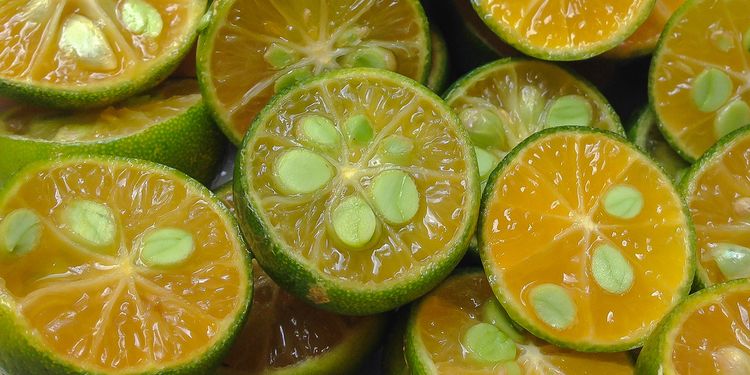
Vitamin C
Vitamin C is an important antioxidant that reduces the damaging charged particles that build up in the body from normal (and abnormal) metabolism. It’s also required in order to make strong collagen, a connective tissue that creates the scaffolding for your entire body, including blood vessels and bones. This would explain why it’s crucially important for healing and healthy growth.1
This antioxidant is very highly concentrated in the brain. Animal studies show that vitamin C deficiency may lead to underdeveloped areas in the brain.10
Vitamin D
Vitamin D, like its fat-soluble counterpart vitamin A, is important for the development of the entire fetus, most notably the brain, immune system, and lungs.11,12

Like vitamin A, vitamin D is a key epigenetic modifier of gene expression, which may explain its far-reaching effects on the body.13
Dave Asprey includes an impressive list of disorders linked to vitamin D deficiency in utero, including asthma, cavities, schizophrenia, brain tumors, epilepsy, and autism. One review article also proposed that a deficiency may play a role in the development of type 1 diabetes and heart disease.12
The Wellness Mama cites research suggesting that supplementation of D3 (cholecalciferol) up to 4,000 IUs decreased the likelihood of developing gestational diabetes by half.3
Vitamin D is one of the only nutrients listed here that your body can synthesize on its own with a little help from the sun. Moderate sun exposure (not to the point of sunburn) can do wonders for optimizing vitamin D levels.
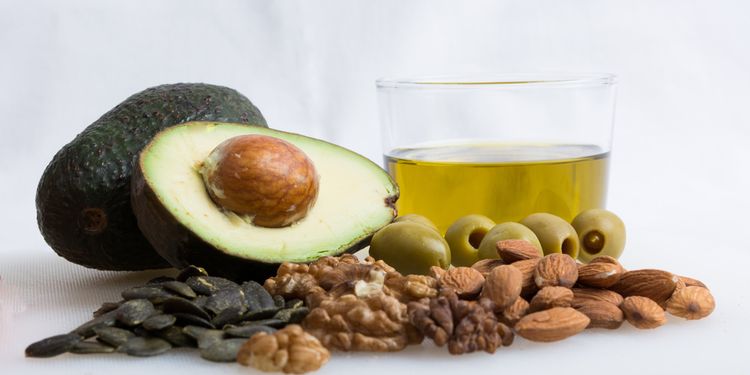
Vitamin E
Vitamin E is an umbrella term for a group of compounds called tocopherols. Tocopherols are fat-soluble antioxidants that keep things like fat molecules and vitamin A from being damaged by oxidation. This is particularly important for the health of our cell membranes, which are all made of fat.
Dave Asprey recommends vitamin E for potentially reducing labor pains and to prevent or reverse congenital heart malformations.1
Like vitamin A, it’s best to obtain this vitamin from food to avoid overdoing it and actually causing complications.
It’s important to note that a lot of vitamin E supplements only provide one type of tocopherol (usually alpha-d-tocopherol); food sources may be superior, because they come with a natural mix of different tocopherols.
Vitamin E is found in its highest amounts in plant sources of fat, such as cold-pressed oils, avocados, and nuts.
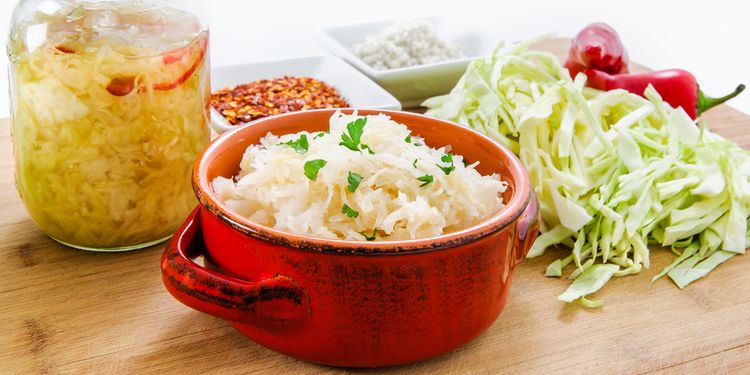
Vitamin K
There are actually two types of K vitamins, and each of them are important to maintain in pregnancy. Vitamin K1 is the vitamin associated with healthy blood clotting. This is important in pregnancy to reduce the risk of too much bleeding, especially when it’s time to deliver.
Vitamin K1 is converted to its usable form in the intestines by your good gut bacteria. Dave Asprey recommends eating lots of green leafy vegetables and taking probiotics to optimize levels.1
Vitamin K2 is structurally similar to K1, but it plays a different role in health. It’s a fat-soluble vitamin that works together with A and D to direct calcium out of the blood and into the bones for strong, healthy bones.5
Vitamin K2 is highest in fats from grass-fed animals, hard cheeses, and a fermented soy dish called natto.5

Essential Minerals
While it’s important to have adequate levels of all your minerals, like calcium and magnesium, Dave Asprey emphasizes iron and iodine as two to focus on during pregnancy.
Iron is an important component of hemoglobin, the protein responsible for carrying oxygen from the lungs to the rest of the body (and to your growing baby). Being anemic (or iron deficient) during pregnancy could decrease the amount of oxygen supplied to the fetus, resulting in complications or miscarriage.14 Asprey points out that if the availability of oxygen is low, it’s automatically rerouted from the developing brain to the vital organs.1
Iodine is a critical component of your thyroid hormones. Hypothyroidism during pregnancy can cause brain damage and other complications, so it’s very important to make sure your thyroid has all the raw materials it needs for healthy functioning.1
Again, you wouldn’t want to overdo it in either of these minerals. Iron is abundant in healthy sources of red meat, and iodine is most common in eggs and sea vegetables. If you’ve tested low in either of these minerals despite including dietary sources, you should consider supplementation.

Omega-3 Essential Fatty Acids
EPA (eicosapentaenoic acid) and DHA (docosaehexanoic acid) are two essential omega-3 fatty acids found primarily in fish. They play an important role in regulating inflammation and brain development.
• EPA is highly anti-inflammatory and is particularly important for balancing out the inflammatory omega-6 oils we accumulate from the prevalence of seed oils in our modern diet.
• DHA is critical to fetal neural development, and maternal deficiency can lead to cognitive delays in children.15
• Although you can find a plant-based omega-3 (ALA, or alpha linoleic acid) that can be converted to EPA, the conversion rate can be variable and dependent on your level of a particular enzyme. Very little if any ALA can be converted to DHA.16
Optimize your intake of these important fats by supplementing with high-purity fish oil or eating wild, low-mercury, cold-water fish.
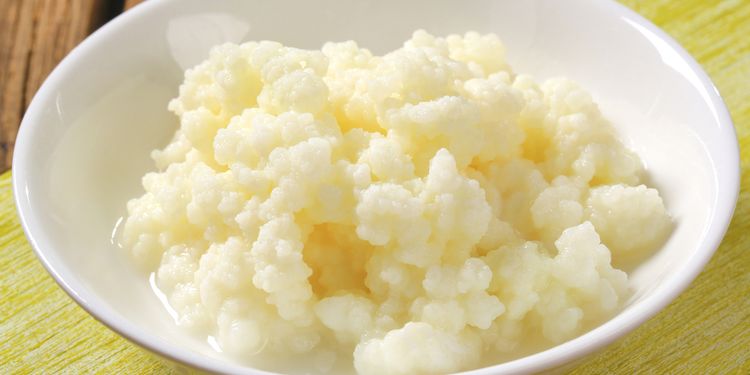
Probiotics
Probiotics serve multiple purposes in your diet regimen. As was mentioned above, probiotics help maintain the beneficial bacteria in the intestines, increasing nutrient availability and absorbability.
The beneficial bacteria in the vaginal tract will be inoculating your baby’s gastrointestinal tract. This is the beginning of their immune system development, and the baby will recognize these bacteria as the good guys. You want to make sure the right bacteria are designated “good guys.”
Dave Asprey recommends a multi-strain probiotic containing Lactobacillus and Bifidobacterium. He also recommends Bacillus subtilis, a specific species that may kill pathogenic bacteria.1
You can also get your dose of probiotics from fermented foods like raw sauerkraut or kefir, but keep in mind that there’s less control over which strains of bacteria you’re actually getting in these products.
Specific Real Food Additions to Consider
You shouldn’t replace real food with supplements to meet all of the above requirements. But how in the world will you be able to get all these nutrients into your diet?
This is where a little thing called nutrient density comes into play. If you can focus on including the nutrient-dense foods below, odds are you’ll be getting most, if not all, of the nutrients your baby is craving.
Chris Kresser recommends the following foods to add into your diet regimen before, during, and after pregnancy.17

Liver from Pastured Animals
This may be a tricky food to include if you’re not very adventurous! However, according to Kresser, liver and other organ meats are the most nutrient-rich foods on the planet. There’s a reason that organ meats were reserved for expecting women in traditional cultures like the Masai tribe of Africa.
Kresser emphasizes that the nutritional benefits of liver are suited to the nutritional needs during pregnancy because:
• Liver contains high amounts of vitamins A and D, two fat-soluble vitamins that are hard to find in large amounts in other food sources.
• Liver also has a wide array of B vitamins, including B9 and B12, which are most well-known for their role in preventing neural tube defects.
• Liver is also a good source of digestible protein.
• Liver is a great source of absorbable iron. Remember, iron helps your blood cells carry oxygen to tissues, including your baby.
Even if you don’t enjoy liver, getting it into your diet at least once or twice a week is all you need to reap all of its nutritional benefits.
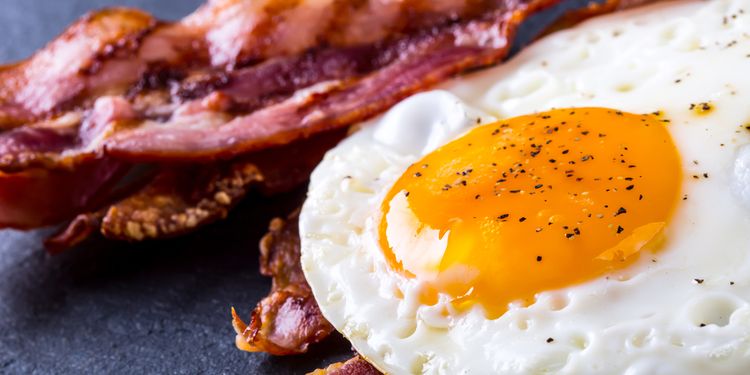
Egg Yolks
Both Kresser and Asprey recommend using egg yolks as a multivitamin food during pregnancy. Egg yolks pack a powerful punch, including omega-3s, cholesterol, B vitamins, and choline. Egg yolks are one of the only food sources of the choline aside from lecithin from soy or sunflower.
Choline is vital for forming healthy neurons that are able to pump out a major neurotransmitter in the brain. Choline is also involved in methylation and is a building block of cell membranes.18
Cold-Water Fish and Grass-Fed Pastured Meat
Cold-water fish is perhaps the best and most potent source of EPA (eicosapentaenoic acid) and DHA (docosaehexanoic acid).
To avoid increasing your exposure to mercury and other toxic chemicals that are known to accumulate in fish, focus on eating fish that are wild, on the smaller side, and that don’t rely too heavily on eating other fish. These include sockeye salmon, herring, and sardines.
While Kresser doesn’t specifically include animal meat from grass-fed, pastured animals, he and many other primal nutrition advocates (including Dave Asprey, The Wellness Mama, and Kelly Brogan, MD) comment on the superior fat profile of these animals.
Animals that eat grass and aren’t confined to a cage produce meat that’s higher in anti-inflammatory omega-3 fatty acids, fat-soluble vitamins, and protein.1

Cod Liver Oil
Not into the idea of beef liver? Cod liver oil may be a good option for you. Although smaller amounts of cod liver oil may be required to get your fix of vitamin A and D, it’s not guaranteed to be palatable, especially if you’re battling pregnancy-induced nausea.
Cod liver oil is a great option to add to your regimen in conjunction with liver, especially if you can only stomach either of them once in a while. If you exclude liver, you’ll also be missing out on the protein, iron, and B vitamins it has to offer.
Grass-Fed and Pastured Dairy
This addition is somewhat controversial. Here are the pros of including dairy from grass-fed animals according to Kresser:17
• Grass-fed dairy is packed with minerals and fat-soluble vitamins like A, D, K2, and E.
• It’s a good source of saturated fat (make sure to get the full-fat kind). Kresser stresses that saturated fat is extremely important for your baby’s development— so important that it will make up a large percentage of your breast milk once the baby is nursing!
• Kresser includes fermented forms such as kefir and yogurt that are lower in lactose, or milk sugar, as a good source for probiotic support, which is important for you and your baby’s immune system.

The cons of milk products include:
• Milk proteins and lactose, especially in pasteurized milk, can be inflammatory in some people.
• According to Dave Asprey, proteins in raw milk aren’t inflammatory, and bacteria help to digest the lactose. However, he also mentions that it can be hard to find raw milk, and there’s a chance that it could be contaminated with bad bacteria, which should be avoided during pregnancy.
• Asprey recommends including grass-fed butter, since there are low amounts of lactose, and the allergenic milk proteins casein and whey in butter and will likely not cause a problem.
Moral of the story: if you tolerate dairy well, it’s a great nutrient-dense food to include in your diet regimen. If you don’t tolerate dairy due to lactose intolerance, try grass-fed yogurt or kefir. If neither of those options work for you, you can try including grass-fed organic butter or ghee (clarified butter) in your diet.
Specific Foods to Limit
Weston A. Price was a dentist in the early to mid-20th century and one of the first researchers to substantiate the importance of maternal nutrition during pregnancy.
Price analyzed the diet and lifestyle of indigenous groups of people who weren’t exposed to a modern lifestyle. He emphasized that the nutritional advantage of these indigenous peoples began from their conception and the nutrient-rich diets required for expecting women in these traditions.19
Price deduced that aside from having a much more nutrient-dense diet, these groups were benefiting largely from the absence of the many modern food inventions listed below.
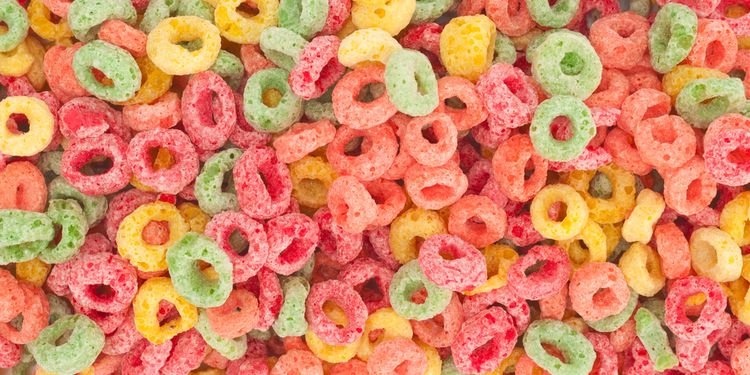
Sugar
Dave Asprey reiterates that not only is sugar not a primary building block for your developing baby, but it’s also not an efficient energy source. Remember:
• Sugar can spike your blood sugar so high that it leads to an extra and delayed release of insulin, creating low blood sugar. This causes energy crashes and the need to keep snacking. These kind of blood sugar swings are very stressful for the fetus.1
• Asprey also comments that prolonged levels of high insulin in the blood from too much sugar may activate genes predisposing your baby to obesity.
• According to Asprey, consumption can also interfere with fetal brain development.
• Sugar feeds the wrong types of bacteria in your gut and vaginal tract. Remember, this is important for developing your baby’s gut flora.
• Sugar is completely nutrient-devoid. When you fill up on sugar, you’re leaving less room to fit in all of the superfoods we mentioned above.
Overall, sugar is extremely inflammatory and taxing on the immune system. The last thing you want is a malfunctioning immune system when you’re actually growing something inside you that may be susceptible to attack.
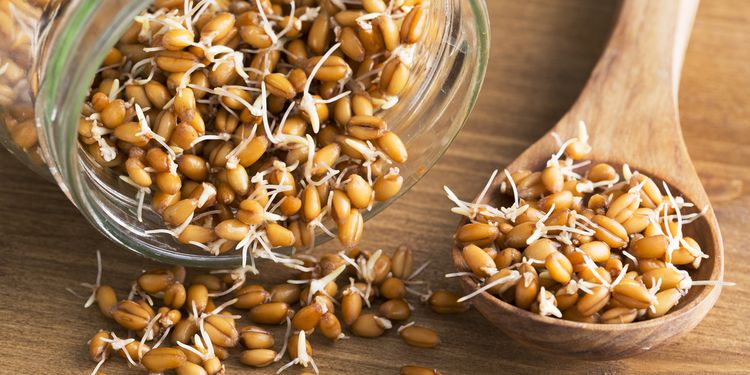
Grain Products
This category includes any product that contains flour made from any sort of grain, whether it’s a gluten-free grain or not.
Refined flour in particular has the same negative consequences associated with too much sugar. It can wreak havoc on your ability to regulate blood sugar in a similar fashion. Like sugar, it’s also completely nutrient-devoid.
Unless your grains have been soaked or sprouted prior to turning them into flour, they likely contain high levels of nutrients that compete for mineral absorption, like phytic acid and lectins.
The proteins in grains can be inflammatory in some people, and since they’re not extremely high in any of the vital nutrients (except maybe some fiber), it may not be worth eating an excessive amount.
If you’re finding that you’re constipated and would benefit from an increase in fiber, increasing your water and soluble fiber intake from vegetables may help. Adding in a serving of cold-processed whole flaxseeds or chia seeds for added fiber may also be beneficial.

Refined Vegetable and Seed Oils
Although vegetable and seed oils have been touted as health foods in the past, science is now uncovering the negative consequences of the high levels of omega-6 fats from these oils. These oils are particularly damaging when they’re cooked.
Omega-6 fatty acids tend to have an inflammatory effect, but omega-3 fatty acids are predominantly anti-inflammatory. According to Mark Sisson, the real problem with omega-6 fatty acids is that they’re easily oxidized, and any oxidized oil is inflammatory in and of itself.
Since the majority of the vegetable and seed oils we consume are cooked at high temperatures, you can pretty much guarantee that the delicate polyunsaturated omega-6 oils will be oxidized by the time you eat them.20
If you’re going to cook with oil, make sure not to overcook your food to the point of charring, and use fats that are more stable at higher temperatures. Chris Kresser recommends coconut oil, ghee, or lard from healthy animals.21

Alcohol and Caffeine
It’s generally accepted that no amount of alcohol is considered safe during pregnancy for fear of birth defects and fetal alcohol syndrome.
Similarly, it’s understood that caffeine can be damaging to fetal development as well. However, there’s a little bit more leeway with caffeine— small amounts have proven to be safe.
Dave Asprey points out that caffeine can pass through the placenta and cause problems for your baby, including increased heart rate and decreased blood flow.1 Since there’s no nutritional benefit to caffeine, there would be no harm eliminating it altogether, especially if you’re sensitive to its effects.
If you’re going to consume caffeine, The Wellness Mama recommends minimizing intake to no more than 1 cup of coffee per day.3
To help you avoid all the foods listed above, one simple piece of advice is to limit packaged foods. For the most part, as long as you’re eating whole foods, you’re eliminating the major sources of the toxic foods listed here.

How to Avoid Unnecessary Toxins
An equally important aspect of a healthy diet is knowing how to avoid toxins, even in “healthy” foods. Too many toxins will deplete the nutrients you’re working so hard to maintain. The key to this step is to know where your food is coming from and exactly what’s in it.
• Try to avoid non-organic genetically modified foods.
• Avoid buying products with a long list of ingredients you can’t pronounce— you’d be surprised how many names they have for monosodium glutamate (MSG). You should be especially careful to avoid food dyes.
• Filter your water with a quality tabletop or built-in water filter. BRITA filters might not be adequate for filtering out excess chlorine, fluorine, and pharmaceuticals that have leached into the water supply. Dave Asprey recommends a built-in reverse osmosis water filtration unit as the gold standard of water filtration.
• Avoid food or drinks packaged in plastic, and especially avoid reheating food in plastic. This includes most canned foods. Even BPA-free plastic contains chemicals that can build up in your body over time.
• Try to avoid charring, frying, or overcooking your food. Dave Asprey emphasizes that overcooking can be hard on digestion and lead to the formation of toxic chemicals that may cause mutations.
• Try to use all-natural cleaning products. Make sure to read the ingredients if you’re purchasing natural products. Just because it comes in a green bottle doesn’t mean it’s non-toxic.
• Don’t forget about the air you breathe, especially if you’re living in an urban environment where there aren’t a lot of trees to revitalize the air. Chris Kresser recently wrote about the advantages of a HEPA filter to minimize toxins in your household air.22
For extra detoxification support, Dave Asprey recommends the use of high-quality liposomal glutathione and activated charcoal.1 Both are best to take on an empty stomach and separate from each other so they don’t interfere with the absorption of other nutrients.

Last But Certainly Not Least, RELAX
Easier said than done, right? Especially given the long list of things to consider after reading this article!
But the best thing you can do for your developing baby, even if you do nothing in the above list, is to have strategies in place to reduce the effects of stress.
This includes whatever it takes to take your body out of fight or flight mode and back into rest and digest mode. Dave and Lana write extensively in their book about the positive effects of being in a relaxed state, as well as the negative effects of too much cortisol (the stress hormone).1
While it’s impossible (and probably not ideal) to eliminate all sources of stress during the 9 months of your pregnancy, implementing one or a few of the following practices will greatly impact you and your baby’s health and happiness.
Meditation
This looks different for different people. You don’t have to sit in silence for 20 minutes to be meditating. Simple deep breathing throughout the day in two- to five-minute intervals can be very beneficial.

Exercise
Exercise is the perfect antidote to stress and even mild depression. If you weren’t very active before you became pregnant, now isn’t the time to train for a marathon. It’s a good idea to incorporate some light to moderate activity in the form of walking, light stretching, and light weightlifting, though. Just don’t overdo it!
Yoga
When modified for pregnant women, yoga is the best of both the exercise and meditative worlds. It’s reaping the mind-altering benefits of exercise while also reducing cortisol levels.
According to Dave Asprey, your baby can sense your stress levels from a very early stage. Since your baby is evaluating the environment he or she is about to enter, you want to make sure you’re not constantly sending your baby stress signals.

What to Take Away
The information in this article is meant to be used as a guideline, not as a rigid, unyielding regimen for creating the perfect child. Babies are born in all sorts of circumstances, and occasional indulgences or accidental toxin exposures won’t make or break your child’s long-term health.
Kelly Brogan, MD, put her diet philosophy for a healthy pregnancy perfectly:
“Eat sustainable, organic meat, fish, eggs, veggies, including root vegetables and squash, fruit, nuts and seeds! Leverage the complexity of food-based information to promote optimal gene expression in that growing baby and support a healthy delivery and postpartum experience in that glorious mama.”23
The added emphasis on the well-balanced diet for your own well-being is important to note. You’ll need all of those vital nutrients for your own health during pregnancy and beyond. And as we discussed earlier, you need to build up your energy reserves and mental faculties for when baby finally makes his or her grand entrance into the world.
